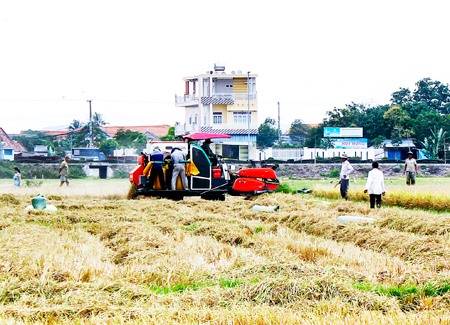 Society
Society

Comprehensive policies, particularly those for disadvantaged areas and those vulnerable to impacts of climate change, are the core of the Government’s programme to build new-style rural areas during the period of 2016 to 2020.
 |
| Farmers harvest rice at Ninh Hiệp Commune, Ninh Hòa District, Khánh Hòa Province. — Photo baokhanhhoa.vn |
HÀ NỘI — Comprehensive policies, particularly those for disadvantaged areas and those vulnerable to impacts of climate change, are the core of the Government’s programme to build new-style rural areas during the period of 2016 to 2020.
The head of the agriculture ministry’s International Co-operation Department, Trần Kim Long, said yesterday at an agriculture co-operation forum that comprehensive policies are expected to speed up socio-economic development in rural areas across the country.
He said it was necessary to diversify resources for the programme and attract private investments. “Overseas assistance including funding and capacity building is also important,” he said.
The country representative of the UN Food and Agriculture Organisation (FAO), Jong Ha Bae, applauded the programme’s achievements since 2010 with improvements in electricity supply, transport, schools and healthcare in rural areas.
However, he pointed out pending problems such as the high rate of poverty, lack of agriculture insurance and of accessibility to funding.
FAO will continue assisting Việt Nam to improve its legal framework and put in place innovate policies to support farming households so that they can better access markets, apply new technologies and increase income.
Carolina V. Figueroa Geron, an expert from the World Bank, said that through the Programme-for-Results (PforR) financing instrument, the organisation helped Việt Nam improve quality of plan-making, supervising and project management.
Also yesterday, Minister and Head of the Government Office Mai Tiến Dũng, who leads a team inspecting Government agencies’ implementation of the PM’s directives, delivered a message to agriculture minister Nguyễn Xuân Cường.
In it, the PM asks Cường to address seven key tasks relating to production and rural area development.
Given that enterprises face difficulties in accessing large areas of farming land, the ministry is asked to speed up land aggregation in the country.
The PM also asked for better quality natural disaster forecasting and response to climate change impacts.
The ministry is required to review criteria for certification of new rural areas because some criteria fail to match reality.
When implementing the Government’s New Rural Area Programme, some localities were too concentrated with infrastructure and less with reforming the economic structure to increase farmers’ income.
Stronger actions were also urged to ensure food safety.
The fifth task set out by the Prime Minister is tightened control of fertiliser, pesticide and animal feed and medicine.
PM Phúc has decided to close natural forests in the Central Highlands and to ban the transfer of non-productive forest land to other projects. He asked for investigation and strict punishment to deter deforestation in Kon Tum and the central province of Quảng Nam.
The final task was a mechanism to assist fishermen affected by the massive fish deaths in four central provinces as a result of industrial pollution. — VNS




